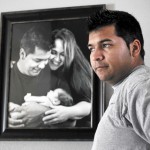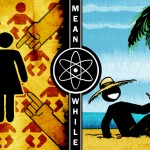Every Monday in Citizenship Confusion, Alan Noble discusses how we confuse our heavenly citizenship with citizenship to the state, culture, and the world.
There are few things more comforting to a believer than to rest on God’s eternal promises for our hope. And because it is so comforting, whole church movements, Christian retail brands, books, albums, and Precious Moments figurines have used promises in God’s Word to ply us from our money. Unfortunately, many (if not most) of the time, these promises are torn from their context and audience in order to make them appear to be promises for us! Perhaps the most notable example of misapplying God’s promises during this political season is the use of 2 Chronicles 7:14 to justify a national revival:
“if my people who are called by my name humble themselves, and pray and seek my face and turn from their wicked ways, then I will hear from heaven and will forgive their sin and heal their land.”
This verse is a particular favorite of the Family Research Council. The FRC’s president, Tony Perkins, used this verse as the guide and inspiration for his national Call2Fall event earlier this year, which claimed that “From 9/11 to war to natural disasters to financial and moral collapse, we are witnessing what happens when a nation turns away from God.” The public policy arm of Focus on the Family, CitizenLink, recently shared this verse in a quote from G.H.W. Bush. Just yesterday, just before the DNC, thousands of evangelicals met to pray and “ask God for forgiveness for national sins” at an event called Charlotte 714, an event which was inspired by 2 Chronicles 7:14. And Right Wing Watch has reported on the popularity of this verse in Christian political rhetoric in recent years.
The idea that Americans have a convenant with God similar to the one between God and ancient Israel has a long history our country. For example, John Winthrop’s famous sermon, “A Model of Christian Charity” written in 1630 and preached to “his fellow Puritan colonists in advance of their landing at the Massachusetts Bay Colony” ends this way:
“And to shut this discourse with that exhortation of Moses, that faithful servant of the Lord, in his last farewell to Israel, Deut. 30. ‘Beloved, there is now set before us life and death, good and evil,’ in that we are commanded this day to love the Lord our God, and to love one another, to walk in his ways and to keep his Commandments and his ordinance and his laws, and the articles of our Covenant with Him, that we may live and be multiplied, and that the Lord our God may bless us in the land whither we go to possess it. But if our hearts shall turn away, so that we will not obey, but shall be seduced, and worship other Gods, our pleasure and profits, and serve them; it is propounded unto us this day, we shall surely perish out of the good land whither we pass over this vast sea to possess it.”
If we obey, God is obligated to bless us. If we disobey, He will curse us. And, citing 2 Chron 7:14, if we are under punishment and repent, God will return to blessing us. Perhaps our understanding of God’s Providence has not matured much in the last 382 years.
The problem is that 2 Chronicles 7:14 records a specific covenant God made with Israel, as our Illustrator-and-Chef, Seth Hahne explains it:
“God is interacting with Israel specifically within the context of the Mosaic covenant and the promises made to Israel within the scope of that covenant. The Mosaic covenant was particularly tied to national Israel during the pre-exilic era and concerned chiefly the land of Canaan (cf Deut. 28 and 29). It was all about how God would bless Israel in the land if they obeyed him and how God would curse them in the land (and eventually exile them from the land if they disobeyed. This is why the Chronicles promise here made to Solomon invokes the promise of healing within the land (of Canaan). The Mosaic covenant is fulfilled so promises that are tied to that covenant are no longer in effect.”
So, to treat this verse as a promise from God to America is bad theology, but if the application of this bad theology is good, does it matter if we’ve misinterpreted it? Humbling ourselves and repenting are unequivocally good actions, and if that’s what this verse calls us to do, then maybe we shouldn’t mind when Christians exhort us with 2 Chronicles 7:14 to political ends.
I’d like to suggest that this is not an instance of “wrong interpretation, but right application.” When 2 Chronicles 7:14 is used to encourage American Christians to repent in order to “heal our land,” they not only misinterpret the text, but also promote an unloving and inaccurate view of the nature and causes of brokenness in our land.
Whose Repentance and Whose Sin?
2 Chronicles 7:14 assumes that the land is under judgement from God because of the wickedness of Israel. So, if we force the passage to fit our situation, we must assume that the US is also under judgement from God because of the wickedness of its citizens. This doesn’t take much imagination to believe; all around us are crimes and injustice and suffering due to sin.
But if we follow FRC’s exhortation from this verse and repent of these sins, exactly whose sins are we repenting of? Is the US under judgement from God because of the sins of Christians or of the whole country–made up predominately of those outside the Church?
Of course, we know that Christians are sinners too, but do most of us sincerely believe that our country is under judgement, is suffering and broken because of the wickedness of the Church?
I suspect that most of us can only answer this question in the affirmative if we conceive of our lack of evangelism and apathy towards condemning and restraining sin in the world as the Church’s wickedness. And some of us do feel this way. Some believe that the American church is wicked because it does not preach against abortion and gay marriage daily.
But, for most of us, if we believe that our country is broken because of wickedness, we believe it is the wickedness of others, principally the unsaved. The sins of the Christian minority of the US hardly account for the suffering in our country. And if this is true, when we go to “repent” for “our” wickedness, aren’t we really just blaming our national problems upon our neighbors, stirring up in our hearts a deep animosity for the unsaved who have infiltrated and corrupted our republic? Aren’t we encouraged to believe that our country’s troubles began when non-Christians began to grow in number and the church did not stop them?
Ancient Israel never had this problem because for them God’s people and the nation of Israel were the same thing. But the Church and the US are not.
I am not at all implying that this is the goal of anyone at FRC–they very clearly see this as a call for Christians to repent–but I do think these concerns are a natural and reasonable outcome from the misuse of this Scripture.
I’d like to submit that this line of thinking is likely to encourage an unloving and uncharitable view of our neighbors, one that feeds the worst kind of Christian political rhetoric and engagement, which sees all non-Christians as existential threats to the righteousness, and therefore blessedness of our country–the militant form of the Culture War.
National Suffering and Sin
Naturally, we believe that sin does cause suffering in our country and the unsaved are lost in their sin. But we also believe in Common Grace, that God blesses the righteous and the wicked, that even leaders who are at war with God can be a blessing to the public, and that God-fearing leaders can support awful, hurtful public policies with the best of intentions.
What’s more, we know from Job that blessings and suffering cannot be directly and causally tied to righteousness and sin. The rain falls on the just and the unjust. The wicked man lives in peace and safety while the righteous suffer. God has not promised to bless us or curse us as a nation when we are good or bad.
To complicate things further, while sin will always cause suffering and righteousness will always result in blessing, the form those sufferings and blessings take will vary widely. Sinful living can lead to a very fulfilling and happy life for some–for a time at least. Likewise, righteous living can result in suffering. In fact, Jesus and the apostles are pretty clear that it will lead to suffering.
The Israelites could look at a draught, or locusts, or pestilence and know that it was a judgement from God for their wickedness, because God had made a covenant with them. He told them explicitly that he would punish them in precisely these ways and that He would rescue them if they repented (2 Chron 7:13).
But God has not made this covenant with us. And when we arrogantly assume that His promise refers to us, we invite ourselves to despise our neighbors for their wickedness and blame them for the economic collapse, mass shootings, wars, inflation, hurricanes, increased taxes, bad healthcare laws, and rising gas prices.
Not only is this unloving and uncharitable to our neighbor, it distracts us from the important work that needs to be done–the hard work of things like figuring out what good healthcare laws look like and how to be good stewards of our natural resources.
So, by all means, humble yourself and repent and petition God to heal our land. But do so knowing that our brokenness came from the Fall and that God is under no obligation to heal our nation if we or our neighbors repent.
—–
Update 09-03-12: added reference to Charlotte714 and comments on “A Model of Christian Charity.”












